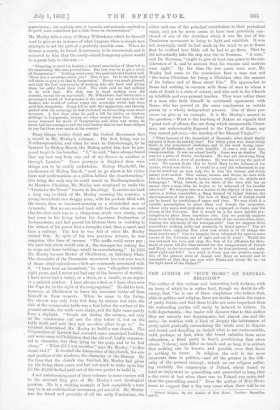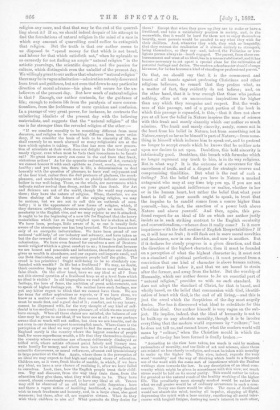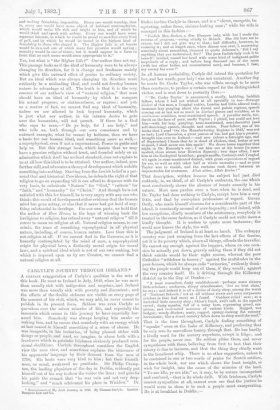THE AUTHOR OF "ECCE HOMO" ON NATURAL RELIGION.*
THE author of this curious and interesting 'book declares, with an irony of which be is rather fond, though we doubt its effi- ciency, that "he is one of those simpletons who believe that, alike in politics and religion, there are truths outside the region of party debate, and that these trails are more important than the contending parties will easily be induced to believe. In both departments,‚ÄĒthe reader will discover that to this author they are scarcely two departments, but almost one and the same,‚ÄĒhe watches with a kind of despair the infatuation of party-spirit gradually surrendering the whole area to dispute and denial, and despising as insipid what is not controvertible, until, perhaps, at last, when the brawl subsides from mere exhaustion, a third party is heard, preclaimiug that when eleven [P clever] men differ so much and so long, it is evident that nothing can be known, and. possible even that there is nothing to know. In religion, the evil is far snore inveterate than in politics,‚ÄĒand all the greater is the diffi- culty of the present attempt; indeed, we see religion suffer- ing veritably the catastrophe of Poland, which found so fatal an enjoyment in quarrelling, and quarrelled so long, that a day came at last when there was no Poland any more, and then the quarrelling ceased." Does the author of Ecce Homo mean to suggest that a day may come when there will be no * IsTaturat Ruh:pion. By the Author of Boo Homo. Loudon: Macmillan and Ce.
religion any more, and that that may be the end of the quarrel- ling about it P If so, we should indeed despair of his attempt to find the foundations of natural religion in the mind of a race in which any amount of quarrelling could suffice to extinguish that religion. But the truth is that our author seems to us disposed to "spend money for that which is not bread, and labour for that which satisfieth not," when he upbraids us an earnestly for not finding an ample "natural religion" in the artistic yearnings, the scientific dogmas, and the passion for c ulture, which distinguish even the unbelief of the present day. We willingly grant to our author that whatever "natural religion" there may be in vague admiration‚ÄĒadmiration not only dissevered from trust and guidance, but not even tied down to any particular direction of moral advance‚ÄĒhis pleas will secure for the un- believers of the present day. But how much of natural religion is that ? Enough, our author contends, for the guidance of life; enough to redeem life from the paralysis of mere conven- tionalism, from the feebleness of mere cynicism and confusion. In a passage of very great power, for instance, he contrasts the unbelieving idealists of the present day with the believing materialists, and suggests that the "natural religion" of the one is far stronger than the revealed religion of the other :-
"U If we consider morality to be something different from more decorum, and religion to be aomethieg different from mere ortho- doxy, if we consider the basis of both to be sincerity of life, we shall scarcely be so much alarmed as many religionists are at the turn which opinion is taking. Who that has seen the new genera- tion of scientists at their work does not delight in their healthy and manly vigour, even when most he feels their iconoclasm to be fanati- cal ? No great harm surely can come in the end from that frank, victorious ardour ! As for the opposite enthusiasm of Art, certainly we cannot honour it with such epithets as fresh, manly, vigorous, or liealthy ; and yet here, too, there is life, a determination to deal honestly with the question of pleasure, to have real enjoyment and of the best kind, rather than the dull pretence of gladness, the mock- pleasure, and mock-happiness which so plainly indicate something hollow in our well-being. These, on the whole, are movements which indicate rather revival than decay, rather life than death. For Art and Science are not of the world, though the world may corrupt them ; they have the nature of religion. When, therefore, we see them shaking off the fetters of the reigning religion, we may be anxious, but we are not to call this an outbreak of secu- larity; it is the appearance of now forms of religion, which, if they threaten orthodoxy, threaten secularity quite as much. Now, secularity is the English vice, and we may rejoice to see it attacked. It ought to be the beginning of a new life for England that the heavy materialism which has so long weighed upon her is shaken at last. We have been, perhaps, little aware of it, as one is usually little aware of the atmosphere one has long breathed. We have been aware only of an energetic industrialism. We have been proud of our national self-help,' of our industry and solvency, and have taken as hut the due reward of these virtues our good-fortune in politics and colonisation. We have even framed for ourselves a sort of Deutero- nomie religioif which is a great comfort to us ; it teaches that because we are honest and peaceable and industrious, therefore our Jehovah gives us vyealth in abundance, and our exports and imports swell, and our Debt diminishes, and our emigrants people half the globe. The creed is too primitive ! Ought well-being to be so obsoletely con- founded with wealth P Is life but a livelihood ? We may, no doubt, think ourselves happy in not being misled, like so many nations, by false ideals. On the other hand, have we any ideal at all ? Does not this eternal question of a livelihood keep us at a level from which ino ideal is visible ? In old biographies we read of high and generous feelings, the love of fame, the ambition of great achievements, not to speak of higher feelings yet. We neither have such feelings, nor yet any bitter regret to think that we cannot have them. We are too tame for either aspirations or regrets, or if we have them, we know as a matter of course that they cannot be indulged. Money must be made first, and a good deal of it ; comfort, not to say luxury, cannot be dispensed with, for the very thought of any kind of self- denial is too medieval ; then comes pleasure, of which we can scarcely have enough. When all these claims are satisfied, the balance of our time may be given to our ideal, if we have one at all ; we are perhaps aware that so much will not suffiee, but then we are bumble, and do not even in our dreams expect to accomplish much. Where there is the perception of an ideal we may expect to find the sense of a vocation. England surely is the country where the largest number of people lead, for mere superfluous wealth, a life that they themselves despise; the country where vocations are oftenest deliberately disobeyed or trifled with, whore artists oftenest paint falsely and literary men write hastily for money, and where men born to be philosophers, or scientific discoverers, or moral reformers, oftenest end ignominiously +in large practice at the Bar. Again, where there is the perception of an ideal we may expect to find high and original views of education. Children arc, as it were, fresh blocks of marble, in which, if We have any ideal, we have a new chance of realising it, after we have failed in ourselves. Look, then how the English people treat their child- ren. Try and discover, the way they train them, from the education they give them, what they wish them to be. They have ceased, almost consciously ceased, to have any ideal at all. Traces may still be observed of an old ideal not quite forgotten ; here and there a vague notion of instilling hardihood, a really decided wish to teach frankness and honesty, and, in a large class, also good manners; but these, after all, arc negative virtues. What do they wish their children to aim at ? What pursuits do they desire for them ? Except that when they grow tip they are to make or have a livelihood, and take a satisfactory position in society, and, in the meanwhile, that it would be hard for them not to enjoy themselves heartily, most parents would be puzzled to say what they wish for their children. And, whatever they wish, they wiah so languidly, that they entrust the realisation of it almost entirely to strangers, being themselves, so they say‚ÄĒand, indeed, the Philistine or irre- ligious person always is‚ÄĒmuch engaged. The parent, from sheer em- barrassment and want of an ideal, has in a manner abdicated, and it has become necessary to set apart a special class for the cultivation of parental feelings and duties. The modern achoolmaster shank] change his name, for he has become a kind of standing or professional parent."
On that, we should say that it is the commonest and truest of all taunts against professing Christians and other religious believers, to remark that they profess what, as a matter of fact, they evidently do not believe ; and, on the other hand, that it is true enough that those who profess nothing, often act on unconscious inspirations far higher than any which they recognise and respect. But the weak- ness of this passage, and of a great portion of the book in which this passage is expanded, is this,‚ÄĒthat it does not show you at all how the belief in Nature inspires the man of science
with this frank and manly sincerity which our author so much admires. The frank and manly sincerity, surely, comes not in the least from his belief in Nature, but from something not in Nature, except so far as he himself is part of Nature,‚ÄĒfrom some- thing in himself which induces him to speak out, and to pretend
no longer to accept creeds which he knows that he neither acts upon nor desires to act upon. Doubtless, this bold sincerity is intrinsically good. Doubtless, this breach with formulas which no longer represent any truth to him, is in its way religious.
But in what way ? It is the outcome of a reverence for the sacredness of truth, and of a disgust for strategic reserve and. compromising tiraidities. But what is the root of such a feeling P Not the belief that you have in Nature a masked antagonist who may at any time trip you up, if you are not on your guard against indifference or malice, whether in her or in the human heart, but rather the belief that what your heart is full of, your mouth ought to speak, in trust that the impulse to be candid comes from a source higher than yourself,‚ÄĒhas, in fact, the sanction of a power both above Nature and above yourself. And then, again, this pro- found respect for an ideal of life on which our author justly insists as in such striking contrast to the English secularity and conventionalism,‚ÄĒwhence does it really come P Is it mere impatience with the dull routine of English Respectabilities ? If so, it will bear no fruit ; it will flash out in mere moral novelties and insolences, now in one direction, and now in another. But if it declares for steady progress in a given direction, and that the direction of the highest character, then it must be founded on a perception of what the highest character is ; it must rest on a standard of spiritual perfection ; it must proceed from a conviction that one kind of character is above human nature, and another kind below it, and that we are bound to strain after the former, and away from the latter. But the worship of Humanity, which our author deems to .be an essential part of "natural religion," provides us with no such standard. It does not adopt the standard of Christ, for that is based, and wholly based, on the belief that communion with God, identifi- cation of heart with God, is the end of all living,‚ÄĒand this is just the creed which the Scepticism of the day most angrily denies. Nor has it discovered what ideal to substitute for this Christian ideal. Our author himself is very vague on the sub- ject. He implies, indeed, that the ideal of humanity is not to be built-up on any absolute morality, though it is to involve everything that the modern world expresses by "culture ;" but he does not tell us, and cannot know, what the modern world will mean by "culture," when the Christian mould in which the culture of to-day has been formed is finally broken :‚ÄĒ
" According to the view here taken, too much is said by modern rationalists of morality, and too little of art and science, since these are related no loss closely to religion, and must be taken with morality to make up the higher life. This view, indeed, regards the very word 'morality' and the way of thinking which leads to a frequent use of the word with the same sort of impatience which the Pauline writings show towards the law. In any description of an ideal corn- triunity which might be given in accordance with this view, not much stress would be laid on its moral purity. This would rather be taken for granted as the natural result of the healthy working of the higher life. The peculiarity most strongly marked would be rather that what we call genius would be of ordinary occurrence in such a com- munity. Every one there would be alive. The cares of livelihood would not absorb the mind, taming all impulse, clogging all flight, depressing the spirit with a base anxiety, smothering all social inter- course with languid fatigue, destroying men's interest in each other,
and making friendship impossible. Every one would worship, that is, every one would have some object of habitual contemplation, which would make life rich and bright to him, and of which he would think and speak with ardour. Every one would have some supreme interest, to which he would be proud to sacrifice every.kind of pelf, and by which he would be bound in the highest kind of friendship to those who shared it. The Higher Life in all hearts would be as a soil out of which many fair growths would spring ; morality would be one of these; but it would appear in a form so fresh that no such name would seem appropriate to it."
Yes, but what is "the Higher Life P" Our author does not say. This passage looks as if the ideal of humanity were to be always changing its direction, for it is change and freshness maiuly
which give this outward effect of genius to ordinary society. But an ideal which was always changing its direction must evidently be a misleading ideal, and could not develop human nature to advantage at all. The truth is that it is the very essence of our author's view of "natural religion," that man should have an ideal of humanity by which to compare his actual progress, or stationariness, or regress ; and. yet, as a matter of fact, we cannot find any ideal of humanity, unless we are allowed to look beyond humanity, which is just what our author, in his intense ,desire to gain over the humanists, will not permit. If there be a God who says to man,‚ÄĒ" Be ye holy, for I am holy," and who tells us, both through our own conscience and by outward example, what, he means by holiness, then we have a basis for our human ideal, and something more as well,‚ÄĒ a superphysical, even if not a supernatural, Power to guide and help us. But this strange book, which insists that we may
have a genuine religion without trust, and founded solely on an admiration which itself has no fixed standard, does not explain to us at all how this ideal is to be attained. Our author, indeed, goes further still, and advocates a theory of development which unfolds somethin g iuto nothing. Starting from the Jewish belief in a per- sonal God. and historical Providence, he defends the right of that religion to go on expanding till it can afford to dispense with its
very basis, to substitute "Nature" for "God," "culture" for "faith," and " humanity " for " Christ." And though he is not satisfied with this for himself, he is very angry with any one who thinks this result of development either evidence that the human mind has gone astray, or else that it never had got hold of any-
thing substantial to develope. For our own parts, we hold that the author of Ecce Homo, in the hope of winning back the irreligious to religion, has refined away "natural religion" till it comes to mean no religion at all. Natural religion means, to our minds, the trace of something superphysical in all physical
nature, including, of course, human nature. Less than this is not religion at all. If we cannot find in the Universe, as it is honestly contemplated by the mind of man, a superphysical origin for physical laws, a distinctly moral origin for moral laws, and a spiritual ideal which is not of our own making, but which is imposed upon us by our Creator, we cannot find a natural religion at all.




































 Previous page
Previous page